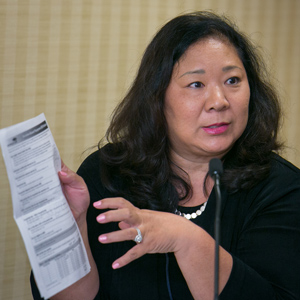Top 10 ways to manage your finances and navigate student debt

Amy Tien-Gordon is managing director of member services and need access for the Access Group. All photos by ©Kathy Anderson.
Everybody from Moses to David Letterman has had a top 10 list.
But Edward N. Tucker, a CPA and founding partner at the Baltimore accounting firm Ellin & Tucker who also serves as secretary of the governing council of the ABA Section of Legal Education and Admissions to the Bar, has one to help law school graduates manage their finances.
Tucker spoke Sunday at an ABA Annual Meeting program, “Navigating the Waters of Student Debt,” co-sponsored by the legal education section and the ABA’s Law Student Division.
He was joined by Joan Howland, immediate-past chair of the section’s council and an associate dean and professor at the University of Minnesota Law School, and Amy Tien-Gordon, managing director of member services and need access for the Access Group, a nonprofit membership organization providing financial education resources to students.
Two third-year law students—Christopher Jennison of Syracuse University College of Law and LinaMaria Perez of Loyola Law School in Los Angeles—were also on the panel primarily to answer questions from a student’s perspective.
Howland said the rising costs of a legal education and high student debt loads come up in many conversations she has these days—be it with lawyers, professors, judges or law students.

Edward N. Tucker speaks at the session entitled “Navigating the Waters of Student Debt” at the 2015 ABA Annual Meeting in Chicago.
“That’s a concern across the ABA, from the top down,” she said.
She said average tuition at public law schools has increased from about $8,000 in 2000 to $28,000 in 2014; at private schools, average tuition has gone from about $22,000 in 2000 to $45,000 last year. The average student debt load over the same time period has gone up from about $45,000 to $75,000 at public schools and from $100,000 to $137,000 at private schools, she said.
But the problem isn’t unique to law schools, she said. The average dental school student graduates with $250,000 in debt. “All of higher education has gotten more expensive,” she added.
The good news, Howland said, is that 86 percent of last year’s graduates found JD-required or JD-preferred jobs nine months after graduation.
She also said it’s important to keep in mind that every law student is fortunate to have had the opportunity to go to law school. “Many people in the world don’t have that choice,” she said.
And she said that every attorney she talks to is happy doing what they do. “There are a lot of happy lawyers out there,” she said.
Tucker is not a lawyer, but he has a son who is. He also has a long association with the section, having spent six years on the Accreditation Committee and six years on the council.
“I’ve worked with folks like you all these years, so I have a special interest in you, your welfare and the profession,” he said.
Here are Tucker’s top 10 tips for managing your finances, which would seem to apply to everybody—not just law school graduates:
1. Plan strategically.
2. Make interest your friend, not your enemy.
3. Learn to understand the miracle of compound interest.
4. Make time your friend, not your enemy.
5. If it’s not measured, it’s not managed.
6. Be realistic.
7. Pay yourself first.
8. Take advantage of qualified retirement plans.
9. Invest early and often.
10. Get yourself a financial planning adviser.
• See what people are saying about the events on social media, and follow along with our full coverage of the 2015 ABA Annual Meeting.



